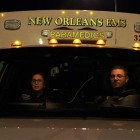
Mar 16, 2015
With the season finale of Nightwatch coming up this week, I got thinking about the value of EMS based EMS. This thinking was also fueled by yet another series of perceived response failures in fire-based EMS services on different sides of the country, specifically in San Francisco and Washington, DC. While I stand by the argument that response times do not matter as much as we allow us to this that we do, I still fail to understand how the general public does not recognize the value of an EMS only service, especially after a certain population and call volume size.
As always, I feel the need to point out that there are exceptions to every rule. There are private services that get it. There are EMS services that are fire-based that do it right. But, as I said above, at a certain size there are others in both of these sectors that fail miserably and fall short of their expectations. The difference between the two though is when a private service fails to meet expectations, they are usually replaced. Quickly. When it is a fire service they are given chance after chance after chance. The vast majority of third service stand alone EMS systems are successful in their missions, and they are successful because they are dedicated to EMS.
What could be better than a team of medics dedicated to providing medicine? How can an argument be made that in a vacuum when you take away any funding issues that might arise from having a standalone department that a stand alone EMS service dedicating themselves 100% to the medical well being of the community that they serve is not the best possible delivery model?
Last month, there was an EMS1 article written about priorities in EMS training. While fire training is usually a lot more extensive than most EMS CEU classes (I am basing this on what I am told by my fire centric colleagues) from the numbers that I have seen reported from a number of different departments the volume of training is not anywhere near to equal or equitable. In my EMS based EMS service, for example, we schedule around sixty hours of training per year and that probably is not even enough. Most reports from fire based services reveal a number closer to the minimum.
There are so many lesson that EMS can learn from the fire service. They have made themselves so relevant in the community outside of spooling up the Federal-Q and responding to another fire. They do prevention. They do a ton of community outreach. Kids love them. Their parents love them. They love them because they are there when they are not needed. While EMS matters to most in an unconscious sense of the concept, it usually does not really matter until somebody picks up the phone and has a need to call 911.
When I worked my part time job at an amusement park, we had trouble explaining the value of our department to the company’s stakeholders. They spoke numbers. They spoke revenue. Here we were, sitting in a meeting next to people talking about ticket sales, and others talking about games revenue and retail sales trying to make people realize that the reason that we held value to the company was because we saved them money. We served in a preventative role, and while after explaining it over and over again they finally got it, I feel like the point would have hit home quicker and harder if they did not have us and saw the result.
The parallel might not be perfect but it is there. EMS departments usually start their PR campaigns when it is too late. We are so reactive in nature that we wait for the emergency call to come in and then we head to it. We wait for a problem to surface, and then we deal with it. We need to change our approach and start helping people understand the importance of having a skilled provider show up at their front door, because more times than not, that far outweighs the speed at which that provider arrives. If your department does not have a Public Information Officer who has actively taken on this mission, then your department is doing it wrong.
That brings me back to Nightwatch and New Orleans EMS. It was not very long ago that the New Orleans Fire Department was starting to lay the ground work for developing a fire-based EMS service. Granted, I am looking at the whole system from a distance but at this point, thanks to the success of A&E’s show, NOEMS has developed a great public relations tool and shown the world how indispensable they are. Let’s face it, since the early episodes this show has turned in to a show about the EMTs and paramedics of New Orleans accented by the experiences of the police department and occasionally the fire department.
There are a lot of lessons that we all can learn from Nightwatch the biggest and most important of which should be that EMS should not be an afterthought. Find a way to make yourselves relevant and indispensable to the community. Show them what your service is capable of and make them love you. Then when the time comes that there is a complaint or a problem with the service being provided, they will look to your department for a solution rather than to somebody else to find another solution.
